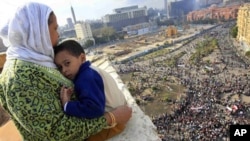The Egyptian military is reinforcing its positions on the streets of Cairo and other cities as anti-government protests continue. Thousands of people staged demonstrations on Sunday, calling for President Hosni Mubarak to resign. And citizens are arming themselves to defend their families and property from looters.
The Egyptian military is deploying new hardware in the skies above Cairo. Fighter jets and helicopters are circling above protestors on the streets below, a show of force that appears so far to have reduced the size of the protests.
In the center of the capital and other cities, the army is reinforcing its positions with more tanks and concrete roadblocks. Alongside, protestors pause for the last call to prayer before resuming their demonstrations.
Still many protestors are defying the 4 p.m. curfew, refusing to give up their protests until President Mubarak is gone.
|
Key Players in Egypt's Crisis
|
For those not out protesting, nightfall brings fear the suburbs of Cairo. With the police nowhere to be seen, groups of men armed with sticks, knives and even guns set-up vigilante groups to protect themselves from looters.
There are local reports of expensive homes being raided, the occupants assaulted and even killed. Many residents claim to have seen non-uniformed police officers directing the looters.
There is relief when daylight arrives.
"The looting is a big problem, and it’s shameful, because Egyptians are never like this. Most people want change - but there are a few people among them who are destroying things, they don’t care about anything," said one man.
The owner of a mobile phone shop that was looted overnight said "there was a big protest in the central ‘Freedom Square.’ But the people who did the protest are not the same people who are doing the looting."
Hosni Mubarak’s appointment of a new Vice President and cabinet has not appeased those who want the president himself to go.
Political analyst Said Sadek is a prolific online blogger. But like other Egyptians, his Internet connection has been cut by the government. He says he does not believe the president can keep his job. "I have seen the Egyptian streets; I have never seen such anger from upper classes, middle classes, lower classes, you name it. The whole country is up in arms against Mubarak. President Mubarak was a war hero. He should be another hero, save the country and resign now," he said.
Sadek says Egypt needs a transitional government to direct the country toward fully democratic elections. His desire is echoed on the streets of cities across Egypt. The protestors want a change of regime. Most Egyptians just want to feel safe in their homes.
Watch Raw Video of ElBaradei Addressing Protesters




